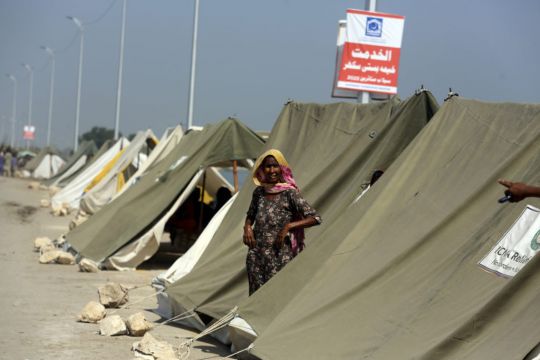Officials in southern Pakistan have warned more flooding is expected as Lake Manchar swelled from unprecedented monsoon rains that began in mid-June and have killed nearly 1,300 people.
Meteorologists forecast more rain in the region in the coming days and authorities have urged villagers in the Jamshoro and Dadu districts of Sindh province near the lake to evacuate.
The rising waters have reached dangerous levels and pose a threat to a protective dyke and embankment, they said.
The lake, located west of the Indus River, is the largest natural freshwater lake in Pakistan and one of the largest in Asia.

Fariduddin Mustafa, an administrator for Jamshoro district, said on Sunday that officials made a cut into the lake’s embankment to allow excess water to escape and ultimately flow into the Indus. But still the water continues to rise, he said.
Parts of Dadu district have already been flooded, officials said.
The development comes a day after Pakistan appealed again to the international community for aid for victims of the unprecedented flooding from monsoon rains that have left millions homeless around the country.
Planes from around the world have been bringing supplies to the impoverished country across a humanitarian air bridge.
Multiple officials and experts have blamed the unusual monsoon rains and flooding on climate change, including UN Secretary-General Antonio Guterres.
Last week, he called on the world to stop “sleepwalking” through the deadly crisis. He will visit Pakistan on Friday to tour flood-hit areas and meet with officials.

In its latest report, Pakistan’s National Disaster Management Authority put the death toll since mid-June – when monsoon rains started weeks earlier this year – at 1,290 as more fatalities were reported from flood affected areas of Sindh, Khyber Pakhtunkhwa and Baluchistan provinces.
The authority said rescue operations are continuing on Sunday, with troops and volunteers using helicopters and boats to get people stranded out of flooded areas to relief camps, where they are provided with shelter, food and health care.
Scores of relief camps have been set up in government buildings servicing tens of thousands of people, while thousands more have taken shelter on roadsides on higher ground.
According to initial government estimates, the devastation has caused £8.7 billion in damage, and planning minister Ahsan Iqbal said on Saturday “the scale of devastation is massive and requires an immense humanitarian response for 33 million people”.







